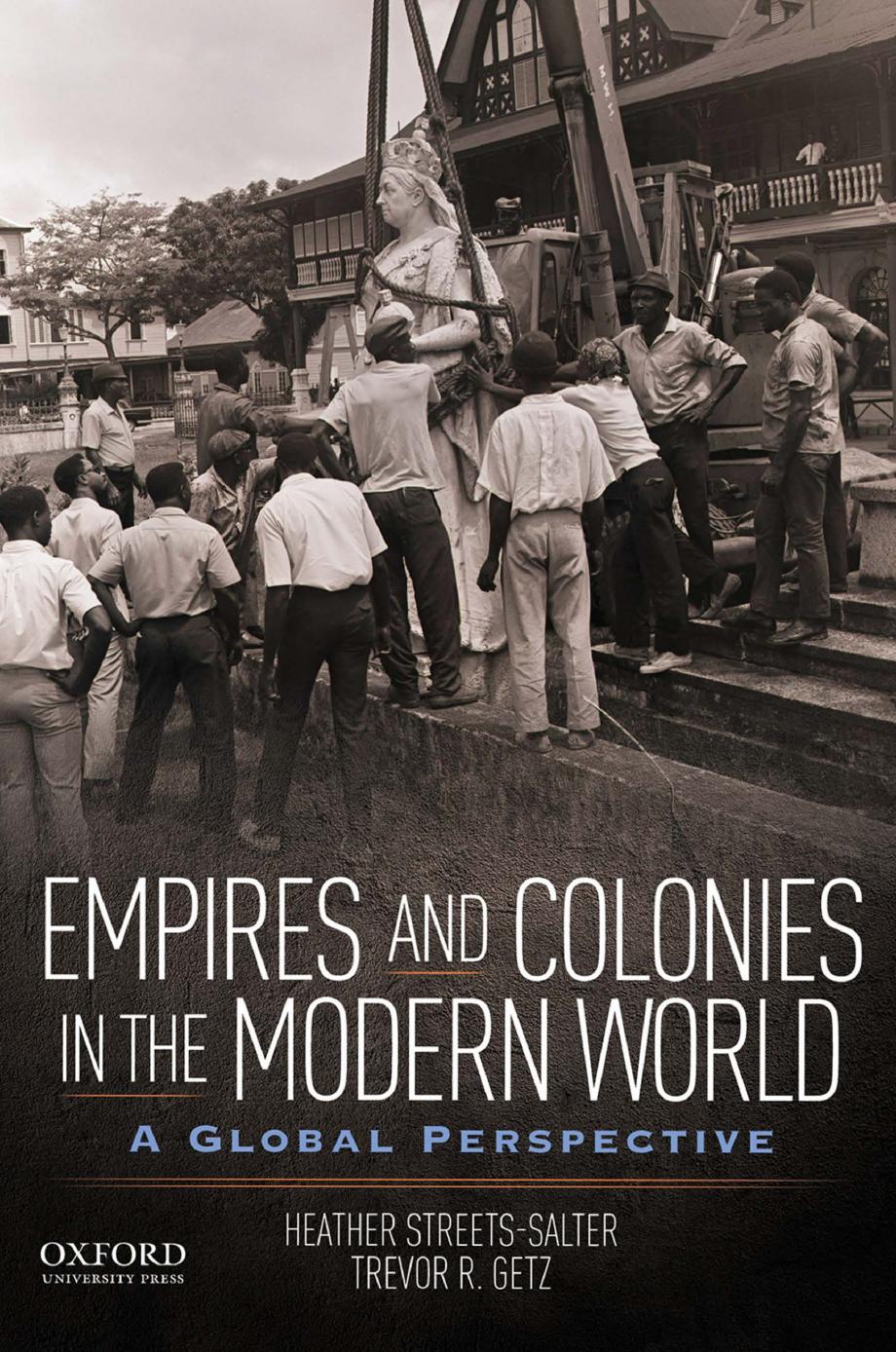EmpirEs and ColoniEs in the Modern World A GlobAl PersPective 1st edition by HEATHER STREETS SALTER, TREVOR GETZ ISBN 0190216387 9780190216382
$70.00 Original price was: $70.00.$50.00Current price is: $50.00.
Instant download EmpirEs and ColoniEs in the Modern World A GlobAl PersPective HEATHER STREETS SALTER & TREVOR GETZ after payment
EmpirEs and ColoniEs in the Modern World A GlobAl PersPective 1st edition by HEATHER STREETS SALTER, TREVOR GETZ – Ebook PDF Instant Download/Delivery: 0190216387, 9780190216382
Full download EmpirEs and ColoniEs in the Modern World A GlobAl PersPective 1st edition after payment

Product details:
ISBN 10: 0190216387
ISBN 13: 9780190216382
Author: HEATHER STREETS SALTER, TREVOR GETZ
In Empires and Colonies in the Modern World: A Global Perspective, Heather Streets-Salter and Trevor R. Getz provide a thorough overview of modern empires and colonialism from the late fifteenth century to the present. Synthesizing the vast outpouring of new scholarship that examines empires in a global context, the book pays as much attention to the Ottoman, Mughal, Ming, and Qing Empires as to European colonialism, and stresses the continuous social, political, and cultural interactions between colonizers and colonized. Amply illustrated with photographs and full-color maps, Empires and Colonies in the Modern World examines numerous issues–including commodity flows, pan-movements, and anti-colonial activism–that superseded the boundaries of colonies and empires entirely. It calls attention not only to the complexities of the internal dynamics of individual empires, but also to the constant interactions between empires, and between colonies with different national metropoles.
EmpirEs and ColoniEs in the Modern World A GlobAl PersPective 1st Table of contents:
PART ONE: The Rise of Early Modern Empires, 1350–1650
CHAPTER ONE: The Forging of Early Modern Empires
- The Emergence of the Early Modern State System
- A Gunpowder Revolution?
- Sectoral Alliances
- The Search for Legitimacy
- Sub-Saharan African Empires?
- Conclusion
CHAPTER TWO: Emerging Imperialism and Colonialism in Early Modern Empires
- Models of Early Modern Colonialism
- Themes in Early Modern Colonialism
- The Economic Underpinnings of Early Modern Integration
- Imperial Interaction and Grand Alliances
- The Portuguese Estado da India
- Conclusion
CHAPTER THREE: Intersecting Empires in the Americas
- Iberian Motivations for Exploration, Trade, and Conquest
- The First Iberian Colonies in the Americas
- American Imperialism
- The Columbian Exchange
- Iberian Empires in the New World
- Conclusion
PART TWO: Atlantic and Asian Empires in a Global Age, 1600–1830
CHAPTER FOUR: The Rise of the Slave-Plantation Complex
- Competition for Empire
- New Europeans in the Americas—English, French, and Dutch Colonial Efforts
- The Sugar Revolution
- Sugar, Slavery, and Transatlantic Societies
- Conclusion
CHAPTER FIVE: Colonial Societies in the Atlantic World
- The Role of Identity in History
- New Societies, New Peoples in the Americas
- New Societies, New Peoples in Africa and Asia
- The Process of Identity Formation
- Creolization
- Acculturation
- Conclusion
CHAPTER SIX: Asian Land Empires in a Global Age
- Continuity and Change from the Mid-Seventeenth Century
- Opportunities and Challenges
- Imperial Strategies and Colonial Modes of Rule
- Questioning Imperial Decline
- Conclusion
PART THREE: Informal Empires? 1810–1880
CHAPTER SEVEN: Revolutions in the Atlantic World
- The Seven Years’ War and Its Consequences
- The War of American Independence and Its Legacies
- The French Revolutionary Wars and the French Caribbean
- The Napoleonic Wars and the Spanish and Portuguese Americas
- Atlantic Rebellions and Global Wars in Southern Africa
- Conclusion
CHAPTER EIGHT: The Industrial Revolution and the Era of Informal Imperialism
- Informal Empire—Anti-Imperialist or Imperialist?
- Industry and Empire
- Cultures of Informal Imperialism
- Informal Imperialism in Action
- Formal Expansion in the Era of Informal Imperialism
- Conclusion
CHAPTER NINE: Living the Colonial Experience
- Modes of Governance
- Common Themes in Nineteenth-Century Colonialism
- Political Change
- The Use of Violence
- Economic Changes
- Social Transformations
- Resisting the Imposition and Effects of Colonial Rule
- Conclusion
PART FOUR: The New Imperialism, 1870–1930
CHAPTER TEN: Dividing the World
- What Was the New Imperialism?
- Why Did the New Imperialism Happen?
- The Annexation of Burma, 1885
- The Struggle for the Upper Nile Valley: The Race for Fashoda from British, French, and African Perspectives
- Japanese Policy Formation and the Invasion of Korea, 1874–1910
- Public Opinion in the United States and the Invasion of Haiti, 1915
- Conclusion
CHAPTER ELEVEN: Strategies of the Colonized
- The Pacification of Vietnam and the Gold Coast
- Imposing Colonial Authority and Sovereignty
- Problematizing Collaboration
- Problematizing Resistance
- Re-Evaluating the Pacification of the Gold Coast and Indochina
- Conclusion
CHAPTER TWELVE: The Sinews of the New Imperialism
- Commodities
- Migration
- Missionism
- War and Military Power
- Gender, Sexuality, and Race
- Conclusion
PART FIVE: The Rise and Fall of High Imperialism, 1890–1975
CHAPTER THIRTEEN: Imperial Projects and Colonial Petitions
- The Colonizers’ Model of the World
- Hierarchy and Colonial Projects in the Era of High Imperialism
- The Proconsular State and the Realities of Colonial Rule
- Strategies of Colonial Subjects: Negotiation, Accommodation, and Petition
- Conclusion
CHAPTER FOURTEEN: Imperial World Wars
- Imperial Ambitions and the First World War
- The Colonial Experience and the First World War
- The Armenian Genocide as a Colonial Event
- Imperial Ambitions and the Second World War
- The Colonial Experience and the Second World War
- The Holocaust as a Colonial Event
- The Aftermath of the Second World War and Political Decolonization
- Conclusion
CHAPTER FIFTEEN: Unraveling Colonialism
- The Challenge Facing Anti-Colonial Movements and the Search for Unifying Ideologies
- The Development of Emancipatory Nationalism
- Organizing Popular Resistance
- The Diffusion of Emancipatory Nationalism: A Global Perspective
- Pan Movements
- Settlers and Settler Nationalism
- The Messy Reality of the Road to Independence
- Conclusion
PART SIX: The World We Live in, 1948 to Today
CHAPTER SIXTEEN: Cold War Empires
- A Cold War Imperial System?
- Soviet and American Cultures of Imperialism
- Cold War Colonialism
- Conclusion
CHAPTER SEVENTEEN: Imperialism Now
- Cultural Colonialism?
- Economic Domination?
- A Modern Chinese Empire?
- Twenty-First-Century Soviet and American Empires?
- Conclusion
SELECT BIBLIOGRAPHY
GLOSSARY
CREDITS
SELECT BIBLIOGRAPHY
INDEX
MAPS
People also search for EmpirEs and ColoniEs in the Modern World A GlobAl PersPective 1st :
a global perspective
a global perspective on the past
a global perspective is essential to sociology because
world war 1 a global perspective answer key
world war 1 a global perspective quizlet
Tags:
HEATHER STREETS SALTER,TREVOR GETZ,EmpirEs and ColoniEs,GlobAl PersPective


